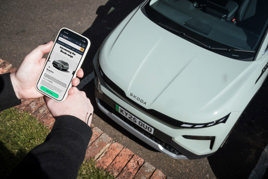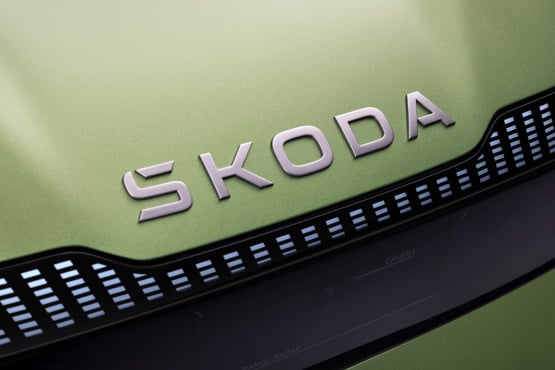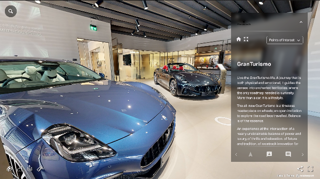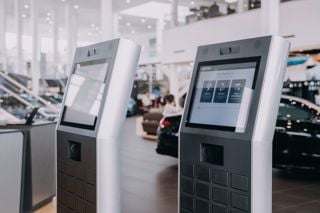In an increasingly data-heavy world of customer experience, one truth remains: people remember how you made them feel.
That principle was the key theme at Transform, Reputation’s annual user event, where the company unveiled a sweeping upgrade in a bid to reimagine itself as an AI-native platform.
More than just a technical milestone, it signals a shift in how automotive brands, like Skoda UK, are listening to and acting on real-world customer sentiment against a background of digital noise.
In an increasingly data-heavy world of customer experience, one truth remains: people remember how you made them feel.
That principle was the key theme at Transform, Reputation’s annual user event, where the company unveiled a sweeping upgrade in a bid to reimagine itself as an AI-native platform.
More than just a technical milestone, it signals a shift in how automotive brands, like Skoda UK, are listening to and acting on real-world customer sentiment against a background of digital noise.
This AI-driven transformation reflects a growing need for brands to reconnect with the “why” behind customer behaviours - not just record the “what”. At the event Skoda UK customer journey manager Emmaline Bruce outlined why the VW Group brand is using the platform to understand existing and future customers better.
At the event Skoda UK customer journey manager Emmaline Bruce outlined why the VW Group brand is using the platform to understand existing and future customers better.
It has been a challenging time for the brand. In 2023, Skoda became the first Volkswagen Group brand in the UK to trial an agency model for electric vehicles initially applying it to the Enyaq and later the Elroq - where dealers operate as agents, earning themselves a fixed 6.5% commission.
By the start of 2025, Volkswagen Group admitted defeat in the wholesale adoption of the agency model with each of its five brands reverting to the franchised model for EVs, giving dealerships margin in the sale. Skoda went first on February 20 with the other marques following in early April.
Amazon showroom
Added to the impact of that pivot was the decision to launch a digital new car sales experience through online retail giant Amazon, to channel new car leads through to dealerships.
Not a switch to direct sales or agency, Skoda said it was rather an additional way to feed new car leads through to their retail partners.
Once they have compared features and found the Skoda model they would like, customers are connected to their preferred retailer who they can visit to arrange finance, agree any part-exchanges and set a collection date.
 The change of business model and a new digital channel have added complexity in how Skoda manages the retail experience at its 120 Skoda dealerships and authorised repairers.
The change of business model and a new digital channel have added complexity in how Skoda manages the retail experience at its 120 Skoda dealerships and authorised repairers.
Bruce told delegates at the Reputation event that the brand’s recent decision to use AI-driven tools was taken with one major motivating factor: to rebuild a connection with the customer, acknowledging that it had deteriorated over recent years.
“For us, the original reason for coming on board with Reputation was our Human Touch initiative which is an initiative with which we really wanted to focus on human interaction,” Bruce explained.
“Being part of a global organisation, we have so many digital platforms and digital technology, obviously in the car itself, but also within the retailer and the showroom experience. But this initiative is about bringing back the local, family feel that our customers used to enjoy.”
Brand trajectory
As Skoda evolved from the butt of old car jokes with cheap, functional cars into a mainstream new car brand that competes with the likes of Ford, Nissan and Vauxhall, she admits that something has been lost in the transformation.
Large, corporate dealerships able to handle higher retail sales volume and keep fleet customers happy began to replace the often owner-driven traditional showrooms upon which Skoda UK had built its foundations.
While the Skoda brand’s visibility surged, and its higher quality cars became a feature of many company car lists, customer satisfaction quietly slipped. In the most recent Driver Power ratings Skoda was at 23rd place in the Best Car Manufacturer category, and in the 2025 Honest John Satisfaction Index it ranked fifth.
“Years ago, we were at the top of all the league tables for customer satisfaction,” Bruce said. “But we’ve dropped down."
The growth has led to loss of "some of that customer intimacy", she said, and Skoda UK turned to Reputation to get a better picture.
Skoda's struggle is not unique. The industry - like many others - is awash with data, yet blind to context in which traditional surveys may ask how a test drive went but may miss deeper emotional cues.
“We never survey anybody who doesn’t buy from us,” Bruce admitted. “We have lots of mandates from our HQ in the Czech Republic, and the questions are very process-led. What we’re missing is: how do customers feel about their experience with us as a brand?”
 By analysing disparate data sources - including Google reviews, unsolicited feedback, and real-time customer interactions, Reputation's enhanced intelligence platform gives Skoda a more human, nuanced understanding of sentiment.
By analysing disparate data sources - including Google reviews, unsolicited feedback, and real-time customer interactions, Reputation's enhanced intelligence platform gives Skoda a more human, nuanced understanding of sentiment.
“Long gone are the days of just coming in and dropping the car off,” Bruce admits. “People want a nice coffee. They want to come in and be able to sit and log on, use the Wi Fi, read a paper or magazine. All of those things actually become an experience.”
Selling electric vehicles also comes with a whole different set of customer expectation. “Customers have done their research, and probably know more than us about electric cars, or the absolute opposite , and want to know everything – and we don't have all the answers. So it's a really tricky place at the minute, trying to attract those customers.
“As a brand we are very much trying to target families, females, a younger audience. Probably two or three years ago, our average age customer was in their 70s. It's probably moved down now to maybe high 50s, but we've still got a huge customer base of mature customers that we still want to retain. But obviously, equally attractive is this newer generation as well. So it's quite hard to get that balance.”
Skoda is now leveraging its customer intelligence gleaned from Reputation not just for internal reporting, but also as a cultural tool. “We’re using the report as part of our Human Touch strategy,” Bruce said. “Our goal is to get retailers more confident in responding to reviews and really seeing the commercial benefits that come from doing so.”
It’s a mindset shift: from data collection to data connection. Bruce hopes that by year’s end, Skoda will have closed key experience gaps and equipped its retailers to better own and respond to feedback, locally and authentically.
Skoda's journey also touches on a wider truth: reputation management today is not just about brand defence - it’s about brand growth where advanced reputation management tools will become central to strategic decision-making, unlocking insights that once sat buried in fragmented datasets or siloed teams.
 Ultimately, such platforms could well empower businesses to become more accountable, more responsive, and more attuned to the voice of the customer.
Ultimately, such platforms could well empower businesses to become more accountable, more responsive, and more attuned to the voice of the customer.
“We have a tendency to focus on all the negative things, whereas we do have a lot of great stuff already happening in the network. Our partners probably don't recognise they're doing a great job so they need our help to use that and share it out with other retailers.”
As Bruce put it: “We’re just looking for that extra piece of insight to tell us: what are we missing?”
Login to continue reading
Or register with AM-online to keep up to date with the latest UK automotive retail industry news and insight.




















Login to comment
Comments
No comments have been made yet.